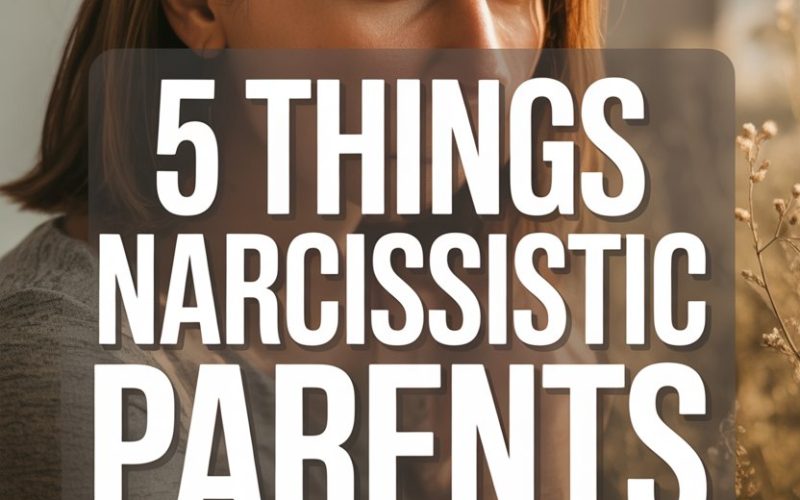Some parents can’t resist the spotlight, even if it means standing in front of their own child’s achievements.
For those who grew up with this brand of parenting—or are co-parenting alongside it—life can feel a little like an episode of Survivor, but with more emotional immunity challenges.
If you find yourself tiptoeing around a parent who needs every room (and conversation) to revolve around them, you’re not imagining things.
Narcissistic parents aren’t just difficult; their reactions are riddled with patterns that are both predictable and completely exhausting.
Here’s a look at five things that leave them flustered, floundering, or downright fuming—and what you can actually do to regain a little peace in your parenting journey.
1. Genuine Independence in Their Kids
Children growing up with narcissistic parents often hear plenty about “family loyalty” and “respect.” Translation: toe the line and don’t make waves.
When kids begin to carve out an identity that’s separate from Mum or Dad—or, heaven forbid, set boundaries—narcissistic parents see it as a personal affront.
Maybe your tween announces she wants to join Scouts instead of following the family tradition of ballet. Or your teen starts texting friends for advice instead of coming to you first.
For a narcissistic parent, this isn’t normal growing up; it’s betrayal, plain and simple.
Why does this press their buttons so dramatically? Narcissistic parents tend to see their children as extensions of themselves, not as separate people.
Any move towards independence threatens the seamless “brand” they’ve built around your family. It’s like someone rebranding their clothing line without permission.
Psychologist Dr. Karyl McBride, author of Will I Ever Be Good Enough?, explains that these parents “see their children as mirrors, reflecting back their own sense of worth.” When the mirror shatters, expect drama.
If you’re raising your own kids now, keep in mind: your child’s blossoming independence means you’ve done something right.
Celebrate it—quietly, if you must—and let the narcissistic parent stew in their own misplaced sense of betrayal. It’s not your job to fix their feelings.
2. Criticism, Even the Constructive Kind
Every parent has a blind spot. Sometimes it’s about screen time; sometimes it’s about the pile of laundry lurking behind a closed door. Narcissistic parents, though, turn every hint of criticism into a three-act play.
Even the gentlest suggestion (“Maybe we could let Emma try out for football this term?”) can be met with icy silence or a monologue about how much they’ve sacrificed.
Research from Psychology Today explores how narcissists are hypersensitive to perceived slights, reacting with rage, defensiveness, or a complete shutdown.
In family life, this means any feedback—no matter how lovingly delivered—is twisted into an attack on their character.
The trick here is to set your expectations low. Feedback won’t change them, but it might help you and your kids feel less like actors in their drama.
When possible, keep your own tone neutral, focus on facts, and, if you need to vent, call a friend who “gets it.” Sometimes the best move is to take a deep breath and decide which battles are truly worth fighting.
3. Emotional Needs That Aren’t Theirs
Kids need hugs when they’re sad, reassurance when they bomb a spelling test, and a sympathetic ear when their best friend ditches them for someone else.
Narcissistic parents, on the other hand, see their own emotions as the only ones that count. Tears, tantrums, or even quiet disappointment from their child are disruptions to the cosmic order.
If you’ve ever watched a child comfort their own parent after a minor inconvenience (“It’s okay, Mum, I’ll try harder next time, don’t be upset”), you’ve seen this in action. Narcissistic parents can’t handle emotional needs that don’t orbit around them.
When their child’s feelings take centre stage, they often react with annoyance, withdrawal, or a sudden, unrelated crisis of their own. (Prepare for the “No one ever thinks about me” song and dance.)
Attachment theory research suggests children of narcissistic parents often learn to suppress their own feelings to keep the peace. This can linger well into adulthood.
For your own kids, model the kind of emotional support you wish you’d received (even if you have to fake it some days). Show them all feelings are welcome, not just the ones that flatter Mum or Dad.
And if your co-parent is the narcissist in question, offer your kids extra reassurance that their feelings matter—a little dose of empathy can go a long way.
4. Sharing the Spotlight
Some parents can’t resist turning every birthday party into their own personal awards show. “Oh, darling, you got a B+ on your science project? Well, I once built a working volcano in Year 7 that impressed the headmaster.”
If you’ve ever had your own childhood milestones overshadowed by a parent’s tales of glory, you know the pain.
Sharing the spotlight is kryptonite to narcissistic parents. During occasions that should be all about their kids—a graduation ceremony, a dance recital, even a silly art competition—they’ll find a way to redirect attention to themselves.
Sometimes it’s overt (“I’m so exhausted from organizing all this!”), sometimes it’s subtle (a well-timed sigh just as your child starts their speech).
According to family therapist Dr. Ramani Durvasula, this relentless need for attention can lead to children feeling invisible or “not enough.”
Over time, kids might stop trying to shine, worried it will trigger another performance from Mum or Dad.
If you’re co-parenting or managing relations with a narcissistic grandparent, try carving out small moments where your child gets the full attention they deserve. It can be as simple as a whispered “I’m so proud of you” after the crowd thins.
Let your kids know their achievements are real, valid, and absolutely worth celebrating—even if someone else tries to steal the applause.
5. Accountability for Their Own Behavior
Perhaps the most frustrating of all: narcissistic parents are allergic to accountability.
They’ll rewrite history, deflect blame, and sometimes spin tales so wild you could swear you dreamt the whole thing. “I never said that,” or “You’re remembering it wrong,” become the soundtrack of family disagreements.
A study from Clinical Child and Family Psychology Review found that narcissistic traits in parents make honest communication almost impossible.
Any attempt to discuss past hurts or set boundaries can trigger a defensive tornado: denial, projection, or a teary “Why are you attacking me?”
Trying to hold a narcissistic parent accountable can feel like yelling into the abyss. But for your own peace—especially if you’re breaking cycles for the next generation—it’s important to acknowledge reality, even if they refuse to.
One strategy: write down key events, conversations, or agreements when they happen. This won’t change a narcissist’s behaviour, but it can help you keep your sanity when the gaslighting sets in.
If the family dynamic gets especially toxic, enlisting a counsellor or impartial mediator can be a lifeline.
When apologies aren’t forthcoming, focus on modeling accountability for your own kids. A simple “I blew it, and I’m sorry” does a lot to teach children what healthy relationships look like—no tap dancing required.
Setting Your Own Script
No one gets to pick their parents, but every parent gets the chance to write a new script for their own family.
If you spent your childhood dodging emotional booby traps or feeling like an extra in someone else’s show, give yourself credit for showing up—and for deciding things can be different now.
Raising kids around a narcissistic parent or grandparent? Keep boundaries clear, celebrate small wins, and remind your kids they’re loved for exactly who they are.
Yes, it’s hard work. No, you’re not alone.
And if you need to slip away for a cuppa and a quiet eye roll after the narcissist’s latest performance—don’t worry, your secret’s safe with me.





